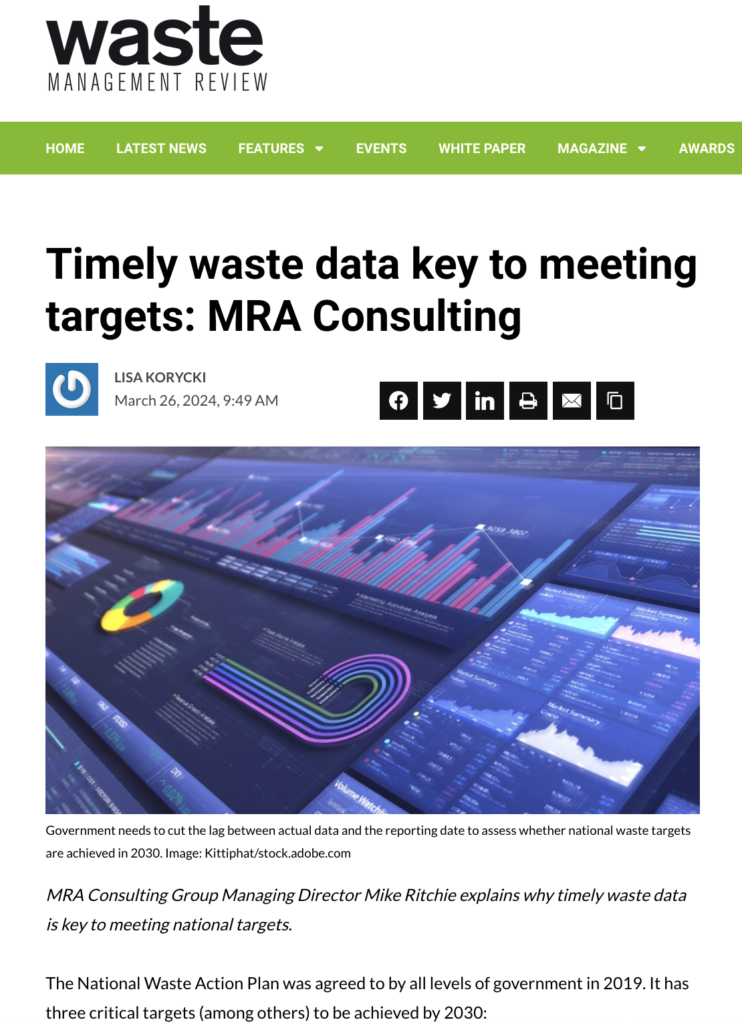In support of timely national waste data
By: Mike Ritchie, MRA Consulting Group

The National Waste Action Plan was agreed to by all levels of Government in 2019. It has three critical targets (amongst others) to be achieved by 2030:
- 80% average resource recovery of all waste streams
- 50% reduction in organics to landfill
- 10% reduction in per capita waste generation
Figure 1 shows the national trend in waste growth (blue line), recycling (yellow) and landfilling (red).
It also shows where we need to be in 2030 if we are to achieve the Targets.
Right now, in 2024, we are about 11 MT short of where we need to be to achieve the 80% resource recovery target.
Thankfully, we have until 2030 to get our act together.
Taking into account population growth and rising per capita consumption (and assuming we don’t have a massive recession in the meantime), it is likely that our economy will be generating about 70 MT of waste in 2030.
An 80% resource recovery rate is approximately 57 MT in 2030.
That means we need to increase recycling from the 11MT gap now, to about 17MT by the time we get to 2030. In only 6 years.
Tweet
I have written elsewhere that achieving those goals is impossible without significant policy changes by governments at both the State and Commonwealth levels. In this article, I want to focus on a related issue.
Readers will notice that we are in 2024 but Figure 1 uses 2021 data. That is the most up to date data published by the States and Commonwealth Government in the National Waste Action Plan Annual Updates.
This is not an exception. In any given year, the data is generally 2-3 years old and out of date.
So, the question I want to pose to Environment Ministers (State and Commonwealth) is:
“What is the relevant data set to assess whether we achieve the Targets in 2030?”
What do I mean by that?
Let’s imagine we wind the clock forward to February 2030 and we are trying to decide if we have hit the Targets or whether new interventions are required.
But in 2030 we would be looking at 2027 or 2028 data.
Do we conclude that 2028 data is good enough? Probably not.
Governments will inevitably say “Oh but we have done all this reform in 2028, 2029 and that is not reflected in the data. Let’s wait until we get the actual 2030 data.”
So we will probably wait until 2032 or 2033 to look backwards to 2030 to see if we achieved the Targets.
That looks like a free pass on accountability to me.
The answer of course is to cut the lag between actual and the reporting date.
The waste/recycling sector is worth about $30B/yr and employs at least 70,000 people directly and many more indirectly.
How do we develop proper policy, make billion dollar investments and employ people, without good data? We don’t.
Having poor and old data is good news for consultants but terrible for industry and investors. We need to fix it.
Tweet
It needs to be brought as close to real time as possible.
I accept that there are data quality checks that need to be done and individual facility data needs to be aggregated (and anonymised to protect commercially sensitive information). But three years is far too long. That is why I have used the term “timely” rather than “real time”.
One of the biggest problems with the data is that some States still use voluntary surveys to assess tonnages. Others are using volume to weight conversion factors. Many smaller facilities are not required to report at all.
The production of the National Waste data report is dependent on, and held up by, the slowest State. That is ridiculous.
In my view we need to move to automated and mandatory tonnage reporting by all waste/recycling facilities above a certain threshold size (say above 1000t/yr throughput).
That means installing weighbridges on all eligible facilities. That is very do-able (and a useful spend of the $1.4B/yr in landfill levies paid to Government each year).
We should ensure that data is aggregated by the States, reviewed and supplied to the Commonwealth within say 6 months of the end of the reporting period. It would fix the problem.
Mike Ritchie is the Managing Director at MRA Consulting Group.
This article has been published by the following media outlets:




